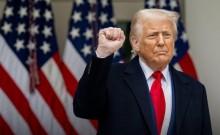Frances far-right Front National (FN) leads the polls after the first round of voting in the countrys regional elections on 6 December. The anti-immigration, anti-EU party won 27.96% of the vote, leading ahead of Nicolas Sarkozys Republicans and allies (26.89%) and President François Hollandes ruling Socialists (23.33%).
FN polled ahead in at least six out of 13 regions in mainland France and with such strong support, it could go on to win a region for the first time in the partys history.
Across the channel, FN is regarded as the French version of Ukip, Britains own anti-immigration, anti-EU party. But both FN and Ukip are very different, both in their origins, views and, most importantly, how likely they are to make a breakthrough into the mainstream. Here are three things you need to know about FN.
Birth of Front National
Front National is a political party in France known to be socially conservative, nationalist, anti-immigration and anti-Europe. It uses Joan of Arc and the French flag as symbols and are both for the death penalty and against gay marriage.
Formed in 1972, its first leader was Jean-Marie Le Pen, an ex-intelligence officer during the Indochina and Algerian wars. He has been made famous for multiple controversial quotes about the Second World War. He once claimed that the Nazi occupation in France was not inhumane.
He also once pronounced: I am not saying that the gas chambers did not exist. I have not seen them myself, I have not really studied the question but I think that they are a point of detail in the story of the Second World War.
He was condemned under the Gayssot Act to pay 1.2 million francs (€183,200, £129,316).
2002: The turning point
Seen until then as a minor player on the political stage, the presidential election of 2002 was a major turning point for FN. In France, the presidential election is decided by two rounds of voting. Historically, Republicans and Socialists always finish first and second.
Convinced this election would follow the same pattern, 28.4% of French people decided to have their Sunday dinner rather than show up at the ballot box.
A low voting turnout, coupled with the vote being split among a multitude of parties (there were 16 for the first round and no less than eight were from left-wing parties) led to a shock result. For the first time in history, FN made it through to the second round of the presidential election.
A success through sweeping up protest votes rather than winning over the public with their policies, this was still a major turning point in FNs history. But when it came to the final round, people rallied around Jacques Chirac to block the nationalists. Chirac was eventually elected president with 82.21% of the votes.
2011: Marine Le Pen and rehabilitation
In the following years, FN went into decline. Demonised in the media and in the political sphere, Le Pen eventually stepped down in 2010 and his daughter, Marine, took leadership of the party. She tried to distance herself from her controversial father and started to change the partys image as not being racist and xenophobic.
In the presidential election of 2012, Marine achieved 17.90% of the votes – the best score ever for the party.
We are now the only real opposition to the ultra liberal left, [who are] unrestricted and libertarian, she claimed in front of her devoted fans after the result, arguing a vote for FN was no longer a protest vote but a vote for the self-called first party of the Nation.
FNs rise has since then been called La vague Bleu Marine – The Navy Blue wave, a pun on the word marine meaning both navy for the iconic colour of the party and the first name of Le Pen.

















